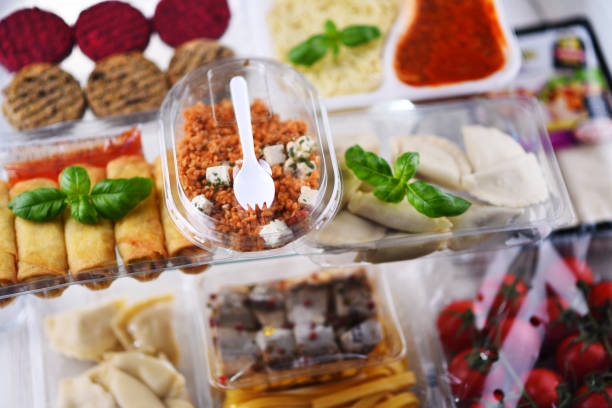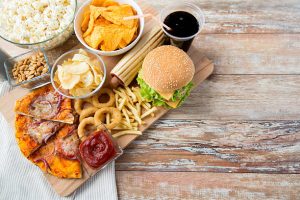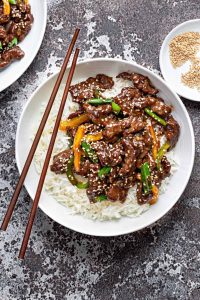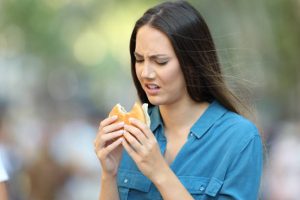Fast-Food Chains with the Most Toxic Food Packaging

You may not think about toxic chemicals when you enjoy a delicious hamburger or crispy fries at your favorite fast food restaurant. You might want to think about it in the light of a recent Consumer Reports investigation.
CR provided a detailed report showing how their experts tested multiple food packaging samples from 118 products sold at 24 restaurants and grocery chains between August 2021 and November 2021. Why? They were searching for perfluoroalkyl or poly-fluoroalkyl substances. These are also known as PFAS. Because PFAS can persist long after their creation, they can contaminate soil, water, and air. Research has shown that PFAS can accumulate in our bodies over time and can cause harm to both human and animal health.
Studies show that PFAS exposure by mothers can lead to lower birth weights and shorter breastfeeding periods. Susan Pinney, Ph.D. of the University of Cincinnati College of Medicine’s Department of Environmental and Public Health Sciences, says that PFAS can also be associated with reduced thyroid and kidney function. There is scientific evidence to suggest that PFAS may be related to certain cancers, such as breast, testicular, and prostate.
CR’s investigation revealed that eight fast-food restaurants and fast-casual chains were on the “naughty” list for having at least one food packaging product (i.e., a sandwich wrapper or a paper bag with sides or kids’ meal fiber tray) that tested positive for high levels PFAS (anything above 100 parts per Million). Names like Arby’s or Burger King are among the eight “Bad Wrap” list-makers. Each restaurant had specific packaging that was found to be toxic.
How did we get to this point?
Roy Plunkett accidentally discovered the first PFAS chemical in 1938 at a DuPont Company plant. Teflon and other PFAS (there are currently more than 9,000 PFAS) make our lives easier. They have properties that resist corrosion wit stand heat (i.e., non-stick pans) and repel water (i.e., water-proof clothing). These PFAS can make paper food packaging less likely to absorb grease and salad dressing, so consumers don’t have soggy plates or wrappers. However, studies have shown that PFAS can migrate into food, particularly acidic, salty, or fatty foods.
“It is worth avoiding greasy fingers. It is not worth the chance of getting cancer,” stated Emily Rogers (Zero Out Toxics Advocate for Public Interest Research Group). They [PFAS chemicals] should not be near food or bodies due to their toxic effects and links to cancer, fertility problems, and other health issues. These chemicals are not worth the health risks they have presented over the past 50 years.
The eight most harmful
Consumer Reports tested the food packaging samples collected for total organic fluorine content. “All PFAS contain organic Fluorine,” stated the report. Each of the eight restaurants included on this list had at most one, while others had several more. One restaurant had five food packaging items containing over 100 parts per million (ppm) of total organ fluorine. This is a measure of PFAS levels. California will ban anything containing more organic fluorine than 100 ppm starting January 2023.
McDonald’s fries bag
McDonald’s packaging contained levels above 100 ppm. The paper bag for French fries had 250.3ppm. Next came the bag for cookies, which included 250 ppm. There was also a bag for chicken McNuggets, 219ppm, and the Big Mac container, which had 195.3ppm.
Mickey D’s will need to work hard to comply with California’s new regulations next year. The chain has previously pledged to ban PFAS up until 2025.
Sweetgreen’s bread bag
The paper bag used for focaccia in the salad chain’s sandwich shop contained 288 ppm of organic fluorine.
Sweetgreen didn’t respond to our requests. Consumer Reports was able to obtain a statement from Sweetgreen that they may have had trace amounts of fluorine in their bowls. PFAS is an issue that is widespread and can be found in every aspect of our daily lives, from water to air to soil.
Burger King’s bag for sweet treats
Burger King’s French toast sticks and cookies were packaged in a paper bag that contained 345.7 ppm of organic fluorine. California will ban the Whopper Wrapper and Bag for Chicken Nuggets from Burger King next year.
Restaurant Brands International, the parent company of the chain, released an official statement on behalf of the brand’s Burger King, Tim Hortons, and Popeyes the same day CR published their investigation. It stated that it intends to eliminate PFAS in all consumer packaging worldwide by 2025 or earlier.




